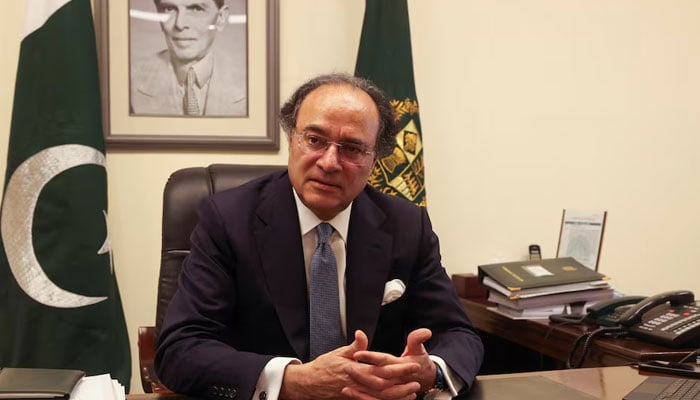Pakistan committed to IMF gas supply to CPPs would be cut off: minister
Mohammad Aurangzeb says IMF deal would be implemented in its true letter and spirit
ISLAMABAD: Amid a heated exchange between Finance Minister Mohammad Aurangzeb and PTI senators, the minister revealed that Pakistan had committed to discontinuing gas supply to captive power plants under a 2021 agreement with the International Monetary Fund (IMF) but it was not implemented by that government.
Minister for Finance Aurangzeb said that such action led to creating a trust deficit in the eyes of the lender of the last resort as the commitment was made and approved in 2021 but it was not even fulfilled in 2024. The minister made it clear that the IMF programme would be implemented in its true letter and spirit and in no way the higher growth trajectory would be pursued based on breaching macroeconomic fundamentals. Referring to the Uraan Pakistan programme, he said that the targets of the IMF programme would be implemented and there would be no compromise on it.
These remarks stirred a heated debate between PTI senator Shibli Faraz and Finance Minister Mohammad Aurangzeb who stated that this was a commitment made by the government in 2021 and the official record showed that the federal cabinet had granted its assent on it but it was never implemented. On this Senator Shibli Faraz replied that you were referring to the PTI-led government which ruled over the country for almost three years but what about those who ruled over 40 years and created a mess on all fronts. Senator Mohsin Aziz from PTI, who was participating online also extended his support.
The finance minister said that he was merely narrating facts and added that he was referring to Dr Ishrat Hussain’s institutional reforms and citing the example of the Sindh government on public-private partnership. “As we move forward there is a need to evolve consensus, he said and added that for signing the Charter of Economy there is a need to evolve consensus on agreed points of the economy. Senator Shibli Faraz said that those who ruled for over 40 years should also be held accountable. He said that no investor was taking us seriously as PIA privatisation and outsourcing of Islamabad airport could be classic examples in this regard.
The Senate panel also took up the issue of the interim CEO Of EXIM Bank and the Minister for Finance said that the export refinance scheme would be phased out under the IMF programme but the government would expedite the process of finding its CEO. The Governor SBP said that there was a target of shifting the re-finance scheme for exporters to the tune of Rs 1 trillion as currently, EXIM Bank was operating through commercial banks by providing subsidies. He said that there were priority areas instead of directive-based lending.
While briefing the Senate Panel, the SBP governor said that the CPI-based inflation might witness some increase in the second half (Jan-June) period owing to the base effect and the possibility of a hike in energy prices. However, the policy rate will be single-digit in the next fiscal year. Owing to a reduction in the policy rate by 900 basis points coming down from 22 percent to 13 percent, the debt servicing was reduced by Rs 1.3 trillion. It will help the government to compensate for its revenue shortfall so the fiscal deficit target of 6 percent for FY2025 is achieved.
The current account turned into a surplus of $900 million resulting in the accumulation of foreign exchange reserves. He said that the current account deficit would range between 0.1 to 1 percent of GDP. He also said that the non-oil imports witnessed a surge indicating that the economic activities might pick up in the second half of the current fiscal year. The SBP has projected that the real GDP growth might hover around 2.5 to 3 percent against the official target of 3.5 percent for the current fiscal year.
-
 Why Ariana Grande Wants A 'tiny Mouse' To Play Her In Biopic?
Why Ariana Grande Wants A 'tiny Mouse' To Play Her In Biopic? -
 Wind Chill Returns With Brutal Cold As Polar Vortex Stalls Over Canada
Wind Chill Returns With Brutal Cold As Polar Vortex Stalls Over Canada -
 Costco $20 Rule Explained As Employee Pay Climbs Across North America
Costco $20 Rule Explained As Employee Pay Climbs Across North America -
 Strange Incident Happened At Nancy Guthrie's Home On Abduction's 10th Day
Strange Incident Happened At Nancy Guthrie's Home On Abduction's 10th Day -
 Tumbler Ridge School Lockdown Underway As RCMP Investigate School Shooting
Tumbler Ridge School Lockdown Underway As RCMP Investigate School Shooting -
 Britney Spears Quietly Parts Ways With Her Music Catalog: Report
Britney Spears Quietly Parts Ways With Her Music Catalog: Report -
 Princess Diana Bodyguard Suspected ‘she Could Die’: Here’s How
Princess Diana Bodyguard Suspected ‘she Could Die’: Here’s How -
 Teddi Mellencamp Marks Huge Milestone With Emotional Message Amid Cancer
Teddi Mellencamp Marks Huge Milestone With Emotional Message Amid Cancer -
 King Charles Makes It ‘absolutely Clear’ He Wants To Solve Royal Crisis
King Charles Makes It ‘absolutely Clear’ He Wants To Solve Royal Crisis -
 Kylie Jenner Looks Back With 'grace' On Early Fame Years: 'Just Being Myself'
Kylie Jenner Looks Back With 'grace' On Early Fame Years: 'Just Being Myself' -
 Royal Family Warned To ‘have Answers’ Amid Weak Standing
Royal Family Warned To ‘have Answers’ Amid Weak Standing -
 Marc Anthony On Why Bad Bunny’s Super Bowl Show Mattered
Marc Anthony On Why Bad Bunny’s Super Bowl Show Mattered -
 Kid Rock Gets Honest About Bad Bunny’s Performance At Super Bowl
Kid Rock Gets Honest About Bad Bunny’s Performance At Super Bowl -
 Kylie Jenner Reveals Real Story Behind Her 'The Moment' Casting
Kylie Jenner Reveals Real Story Behind Her 'The Moment' Casting -
 Jaafar Jackson Breaks Silence On Becoming Michael Jackson
Jaafar Jackson Breaks Silence On Becoming Michael Jackson -
 Eva Mendes Admits She Was Jealous Of Ryan Gosling’s CGI ‘girlfriend’ Rocky
Eva Mendes Admits She Was Jealous Of Ryan Gosling’s CGI ‘girlfriend’ Rocky




